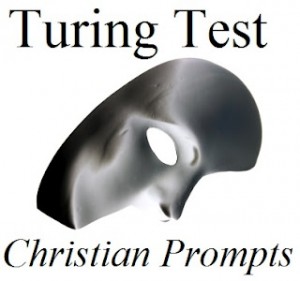This is the eleventh entry in the Christian round of the 2012 Ideological Turing Test for Religion. In this round, the honest answers of Christians are mixed in with atheists’ best efforts to talk like Christians. It’s your job to see if you can spot the difference. The voting link appears at the end of the entry, and you can look at all entries in this round here.
When (if ever) have you deferred to your philosophical or theological system over your intuitions?
I’ve deferred to my morality primarily in sexual fidelity and precision in apology. It is my intuition that there is nothing wrong with self-pleasuring or mutual self-pleasuring as marital sexual relations, in non-reproductive acts. However, my religion demands the use of genitalia only in sexual acts with the potential for reproduction, because sex should be a coming together in unity of two parties and God with the potential of a third party’s creation / involvement, in the model of the triune God’s creation at the beginning of the world; therefore, I strive to partake in no such self-pleasuring acts. I also, intuitively, desire to make people happy, and if someone is offended at me, my first intuition is to apologize profusely for what I did. However, my moral system demands that I be honest above being unoffensive, and therefore I will refuse to apologize for any act which, after due contemplation, I believe was morally correct for me to do. I’ll apologize for the hurt caused, but I will not (for instance) apologize for asking someone to recuse themselves given a previous act that involved dubious lawfulness in the matter, publicly, even though they believe they did nothing unlawful and that their acts gave the highest possible utility in this previous case.
Are there people whose opinions on morality you trust more than your own? How do you recognize them? How is trusting them different than trusting someone’s opinion on physics?
I have a few people (i.e. the Catholic Magisterium) whose morals I trust more than my own: I adjudge this by comparing their morality to the things I believe I am unambiguously convinced of, and if they agree in all such cases, and have a well-logicked trustable explanation of their reasons for believing on topics that I am uncertain my views on, I am likely to believe them. Mathematically: consider there to be a set of topics S={existence of God, mechanism of world generation, most important value, ramifications of being honest, occasions in which it is acceptable to lie,…} where I am convinced of the truth, and a set of topics Q={free will, action on my homosexual impulses, correct number of members in a long-term childbearing relationship, …} where I have plausible arguments for many different decisions on each of these topics in Q and I cannot decide which is the truth. If a person agrees with me for all s in S, and holds strongly to a self-consistent set of arguments, each of which I find plausible, for all q in Q, and has a reason to dismiss the compelling counterarguments on each q beyond an axiomatic dismissal, I will trust them more than my own indecision.
This is roughly indistinguishable from trusting someone on physics: I hold a set of physics knowledges about how the world works from my daily experiences, and I have a set of things I do not know about the world. I will trust someone who agrees with me in the physics knowledges that I hold, has a self-consistent set of beliefs about the things I do not know about the world, and can reject the alternatives for the things I do not know about the world. For instance, I do not personally know whether atoms are actually solid, or whether atoms are made up of electrons and a nucleus and mostly empty space. However, I’ll trust Rutherford when he claims that they are mostly empty space with a little nucleus, and rejects the other hypotheses on the basis of shooting alpha particles at a gold foil and having most of them go right through.
Can you name any works of art (interpreted pretty broadly: books, music, plays, poetry, mathematical proofs, etc) which really capture the way you see life/fill you with a sense of awe and wonder? You can give a short explanation or just list a few pieces.
The book Nature, by Emerson: he accurately reflects the beauty of the natural world and praises it as the ultimate source of truth. His building up of a self-consistent moral system from this is compelling, and his axioms are believable; and more than that, his awe of nature reflects mine and urges the same sort of morality as that which I hold. He does speak of God, but God may easily be excised from his book: his writings are quite believable without God, and his looking to Nature for inspiration is basically the same as my emphasis on natural principles as the reason I can believe that being a good person and being as natural as possible is worthwhile.
Click here to judge this entry, and, once you’ve voted, feel free to speculate and trade theories in the comments or look at other entries in this round.












